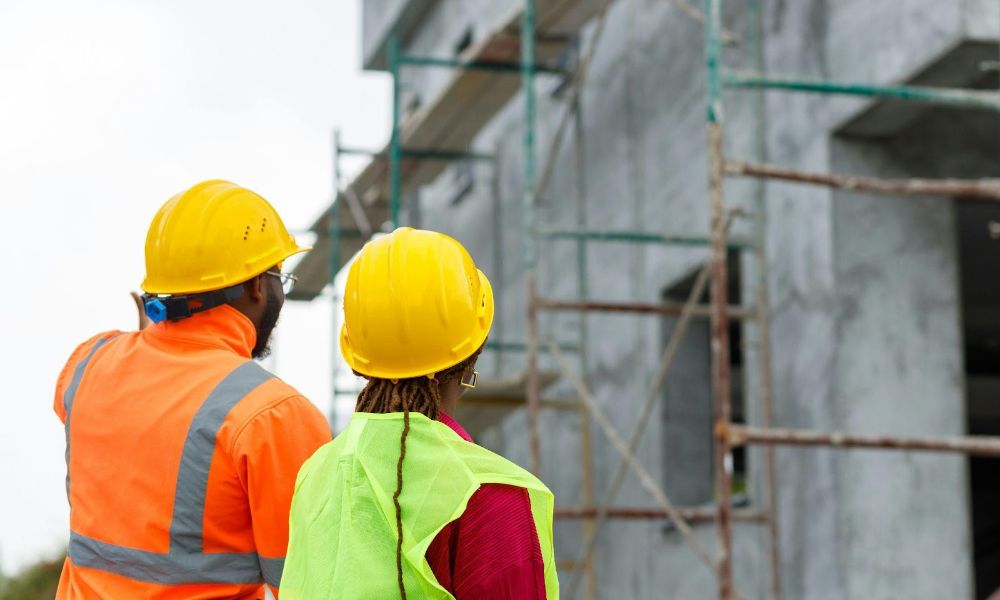Careful planning of your budget and timeline is crucial for avoiding financial surprises and delays.
- Selecting a reliable home builder ensures smooth communication and high-quality work.
- Clear and consistent communication with your builder helps prevent misunderstandings and keeps the project on track.
- Trusting your builder’s expertise while staying involved strikes the right balance between oversight and stress reduction.
- Flexibility in handling changes and setbacks is key to maintaining a stress-free home building experience.
Building a home is often seen as one of the most stressful experiences in life. From managing budgets to ensuring everything stays on track, it’s easy for the process to feel overwhelming. However, with careful planning and the right strategies in place, home construction can be much smoother than expected.
This post will provide you with practical tips to help navigate the home building journey confidently. Whether you’re a first-time home builder or have been through the process before, these strategies will help keep things organised, reduce anxiety, and ensure a successful outcome. Ready to take control of your home building project? Let’s dive in.
Plan Your Budget and Timeline Carefully
One of the biggest stress factors in home building comes from financial uncertainty and delays. That’s why meticulous planning of both your budget and timeline is the first crucial step. Without a solid financial plan, costs can quickly spiral out of control. Sit down early in the process and map out a realistic budget that covers everything from materials to labour, permits, design, and even unexpected costs that may arise. It’s wise to include a contingency fund—around 10% of your total budget—to account for any unforeseen expenses that might crop up during construction. This cushion will allow you to handle surprises without derailing your entire project.
When planning your timeline, it’s important to be both optimistic and practical. While everyone hopes to finish ahead of schedule, construction projects are notorious for delays. Whether it’s bad weather, material shortages, or even contractor schedules, many factors can slow down progress. Creating a detailed timeline that factors in potential delays will help reduce stress. Work with your builder to set realistic milestones and completion dates for each phase of the project. Having a flexible timeline allows you to deal with minor setbacks without feeling like the entire project is off course.
Also, consider the timing of your payments. Some builders may have payment schedules that coincide with project milestones. This ensures that funds are released as work is completed, keeping everyone accountable and the budget on track. You can avoid last-minute financial stress by planning your payments well in advance and ensuring that they align with your own financial situation.
Another important aspect of budgeting and timeline planning is understanding the difference between “must-haves” and “nice-to-haves.” Sometimes, unexpected costs mean you’ll need to cut back in certain areas. By determining your priorities early on—whether it’s high-end kitchen finishes or energy-efficient windows—you’ll be able to make quick decisions without scrambling if changes need to be made.
Ultimately, the more time you spend carefully crafting your budget and timeline at the outset, the less stressful the home building process will be. Good planning helps you avoid common financial and scheduling pitfalls, leaving you free to focus on the excitement of watching your dream home take shape.
Research and Choose the Right Builder
One of the biggest factors in determining how smooth your home building process will be is the builder you choose. A home builder can make all the difference in ensuring everything stays on track and your vision is brought to life. It’s essential to take the time to research thoroughly before making your decision. Look for builders with strong reputations, positive reviews, and plenty of experience in projects similar to yours.
When choosing a reliable home builder, consider not only their credentials but also how well they communicate and align with your expectations. Are they easy to reach? Do they take the time to answer your questions and explain the process clearly? These factors are just as important as their technical skills. Hiring a builder you trust will significantly reduce the stress that comes from second-guessing or worrying about potential problems.
Take the time to gather quotes, check references, and visit some of their completed projects to ensure you’re making the best choice.
Communicate Clearly and Consistently
Effective communication is key to a successful and stress-free home building process. From the initial planning stages to the final touches, maintaining clear and regular communication with your builder is essential. Set up regular meetings or check-ins to ensure everyone is on the same page. This helps to prevent misunderstandings and keeps the project running smoothly.
When starting your project, establish expectations early on. Let your builder know how often you’d like to be updated and what kind of details you want to hear about. Are there specific milestones or decisions you want to be involved in? If so, communicate this from the outset. Miscommunication is a leading cause of stress in construction, and many issues can be avoided simply by keeping the lines of communication open.
Remember, it’s better to ask questions or clarify concerns immediately rather than letting them build up. A good builder will appreciate your involvement and be happy to keep you informed throughout the process.
Stay Involved but Trust the Experts
While staying informed and involved is crucial, it’s equally important to trust the expertise of the professionals you’ve hired. After all, you chose your builder for their skills and experience, so leaning on their knowledge will make the process smoother. Trying to micromanage every detail can create tension and increase your own stress.
Instead, find a balance. Be proactive in checking on the project’s progress, but avoid hovering over every decision. Regular updates and site visits will give you the oversight you need without overstepping. Trusting your builder and the team will not only ease your stress but also allow the project to flow more naturally.
For example, your contractor may decide that using rebar is necessary to boost safety and efficiency of your structure. You could stop the whole project while you research the advantages and disadvantages of rebar (see this article by FMP Construction for more information). Or, you could decide that you trust your contract manager, and, if it’s a budget-friendly choice, let them move ahead with minimal delays.
Involvement doesn’t mean managing every step—it’s about staying aware of the big picture while letting the professionals handle the details. This trust ensures that the project moves forward efficiently, without unnecessary interference that could cause delays or frustrations.
Handle Changes and Setbacks Gracefully
No matter how well you plan, changes and setbacks are inevitable during a home building project. Weather delays, material shortages, or unexpected design issues can all arise. The key to maintaining a stress-free process is handling these challenges with flexibility and patience.
Rather than viewing every setback as a crisis, consider them as part of the journey. Prepare yourself mentally for possible changes in the timeline or budget and have contingency plans in place. Being adaptable can make a huge difference in how you experience the home building process. Discuss potential issues with your builder in advance, so you know how they plan to handle delays or modifications if they occur.
By approaching the project with a mindset that allows for some flexibility, you’ll find that these inevitable bumps in the road won’t derail your progress or your peace of mind.
Conclusion
Building a home can be a challenging but deeply rewarding experience, and with the right strategies, it doesn’t have to be a stressful one. From setting a solid budget and timeline to selecting a home builder and communicating effectively, each step of the process can be managed smoothly with proper planning.
Remember to stay involved, trust the professionals, and be prepared for any changes that come your way. With these strategies in place, you’ll be well on your way to completing your dream home without unnecessary stress.




